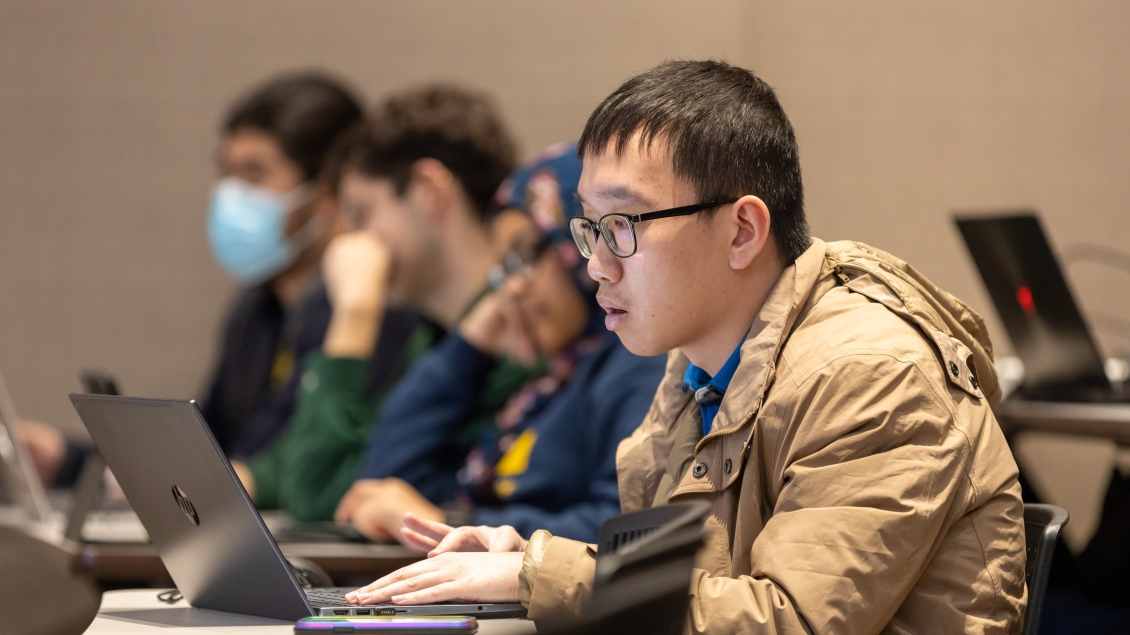
The Bioinformatics PhD | MS Dual Degree Program is designed for PhD or Master’s students who wish to pursue a dual Master’s degree in Bioinformatics.
PhD students who wish to pursue a dual Master’s degree in Bioinformatics must apply by August 1 directly to the Bioinformatics Program through the Rackham Graduate School. List the upcoming Fall term as your proposed term of enrollment.
Students who are interested in obtaining a Bioinformatics Master’s degree, while pursuing a PhD are strongly encouraged to consult with Master's Program Director, Dr. Alla Karnovsky before applying for the program.
Interested students should consult with Dr. Alla Karnovsky before enrolling in classes, as applicants with limited computer programming may be required to take preparatory courses in their first year. Grades obtained in these first-year bioinformatics courses will be considered during the evaluation of applicants for suitability for the MS Program.
For PhD students, please note that in addition to the course requirements students must have bioinformatics-related content in their final dissertation. They are also required to have at least one DCMB faculty (primary or joint) on their dissertation committee, who will approve of the bioinformatics-related portion of the dissertation. Dual degree PhD/MS students will have their MS degree conferred in their final term, at the same time as their PhD degree.
If a PhD student applies after August 1 of their first year, a written justification of why the student waited before applying is required. Applications from candidate-level PhD students are discouraged, as the ability to take additional classes is limited for candidates.
The Bioinformatics Graduate Program encourages applications from traditionally underrepresented minorities, students with disabilities, and those from disadvantaged backgrounds. There are funding opportunities and resources both from the program and other campus units to contribute to students' overall well-being while pursuing studies. Several resources available to students can be found on the Rackham Graduate School Diversity, Equity, and Inclusion website.
In addition, DCMB’s faculty members participate at events around the country, such as the Annual Biomedical Research Conference for Minority Students (ABRCMS).
Diversity is a key component of excellence, especially for solving the complex biomedical challenges that our field of computational medicine and bioinformatics faces. We believe that all people—regardless of background, race, religion, sexual/gender orientation, age or disability—deserve an equitable opportunity to pursue the education and career of their choice.
All application materials are due by the deadline and should be submitted electronically when possible. Please note that applications submitted early will not be reviewed prior to the deadline.
The Bioinformatics Program requires a minimum GPA of 3.2.Submit your dual admission application via the Rackham website: https://rackham.umich.edu/admissions/current-and-former-rackham-students/#dual-admission
The application fee is $10.
All required materials to be submitted via the website above include:The Rackham Pre-approval Form, signed by your home department. **DO not send this to the program. It must be submitted online with your application for Rackham to access.
Statement of Purpose
The Statement of Purpose should be a concise, well-written statement about your academic and research background, your career goals, and specific to the Bioinformatics Program.Current C.V.
UM transcripts (unofficial are ok)
If beyond your first year of graduate study, a written justification of why the application is delayed. Applicants who have already achieved candidacy are discouraged.
The only materials to be submitted directly to the [email protected] mailbox:
Letters of recommendation (1 required)*
A letter from your advisor(s) is required. It can be brief (1 – 2 paragraphs), yet it should attest to your abilities and why pursuing a BIOINF MS degree would be appropriate for your studies.If any questions, please contact the department at [email protected].
We find a new reason to love Ann Arbor nearly every day — year-round outdoor activities, cultural experiences, a growing food scene, and a welcoming, family-friendly atmosphere are just a few that come to mind. Explore all that Ann Arbor and our surrounding communities have to offer.
Our Master's students are largely self-funded. You may apply for teaching or research assistantships, but there is no guarantee. Please note that the Bioinformatics Program offers few positions and priority is given to PhD students. A student may obtain a teaching position (GSI) in another unit.
While many Master's students get some funding, rarely is a student fully funded without some type of external award or fellowship. If interested in research assistantships, you need to contact specific faculty for those positions. Having significant programming experience is helpful.
Yes. Some students take coursework while working full time. A student is expected to complete all coursework within five years from the date of first enrollment in the program.
Bioinformatics consists of a mathematical and/or statistical analysis of a biomedical problem using computation. We define bioinformatics widely and include traditional bioinformatics areas such as for examples, systems biology, genomics, proteomics, plus statistical and evolutionary genetics, clinical informatics, and protein modeling.
As an interdisciplinary field, Bioinformatics attracts graduate students from mathematics, statistics, physics, computer science, biomedical engineering, chemistry, biochemistry and biology. Most incoming students have both a major in one and a minor in another discipline. In recent years students have entered with undergraduate training in bioinformatics or computational biology.
No. A thesis option is not available. Students are required to complete a research component (see above) and to publish that work as a scientific article in venues such as conferences or journals. Such publications should be of great benefit to students.